Dir. by Nicolas Klotz
Heartbeat Detector is a tricky one. Immediately after my first viewing a couple weeks ago, I went searching for decent writing about it but found slim pickings. Judging by the responses of most critics I’ve found online, it’s little more than a too-long and “oh so European” corporate thriller. Unflattering comparisons to Michael Clayton are the norm, and there’s a not-so-subtle (and strangely patronizing) animosity running through the reviews: that a film would seriously compare the workings of modern capital to the Holocaust is just too much, apparently.
This kind of “critic of critics” metacommentary is boring, I know, but I mention it because, to be honest, all that really interested me after that first viewing was trying to make sense of the first hour of the film, nearly half of which is given over to a series of mesmerizing, Claire Denis-like musical sequences. Heartbeat Detector is the first of Klotz’s films I’ve seen*, but it was obvious from the opening moments that he’s a formalist, that the real work of the film is being done with the camera and mise-en-scene, and that the “Corporate Manager as Oberführer” theme is being explored in a dialectic with something more generous and ineffable. Those critics who proved themselves unwilling or unable to write about form did this film a real disservice.
This is the first of what I hope will be several posts about Heartbeat Detector. My goal, eventually, is to make sense of those music sequences, though I suspect it will take several steps to get there. For the record, I’ve tweaked the levels of my screen captures in order to make them more “readable” at this size. The film’s original palatte — at least as it’s reproduced on DVD — is darker and less vibrant.
Have a seat
First, a genre convention. Simon Kessler (Mathieu Almeric) is a human resources psychologist at a German multinational corporation that he calls “S. C. Farb.” (That the film is being told by a limited and possibly unreliable first-person narrator has also gone largely unnoticed.) In the opening moments of the film, he’s called into the office of Karl Rose (Jean-Pierre Kalfon), the company’s second in command, who informs Simon that the board is growing concerned with the increasingly erratic behavior of Farb’s CEO, Matthias Just (Michael Lonsdale). Simon is assigned the task of investigating and evaluating Just’s mental fitness, thus turning him into a kind of generic, film noir detective.
His conversation with Karl Rose proves to be the first of many fact-finding interviews for Simon, and the staging of these interview scenes is one clue to Klotz’s formal strategy. When he first enters Rose’s office, Simon is invited by Rose to sit in the middle of a couch, which leaves his superior in the unnatural position you see in the first image below.
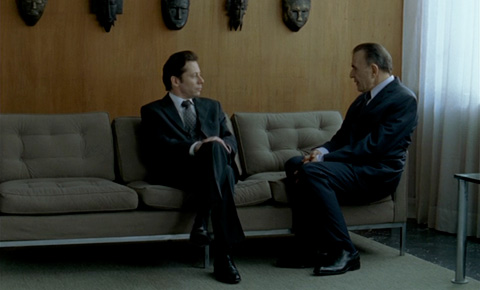
Klotz then cuts to a static, close-up of Rose and holds him there for several minutes as he tells Simon about Just. Notice that the scene has been designed in order to fake an odd variation of a shot / countershot that very consciously refuses to make an eyeline match. The voice-over narration might be Simon’s, but the camera remains as distant as possible from his subjectivity. Notice, also, the flat background behind each man’s face. This is a subtle doubling motif that draws a visual parallel between Simon and Rose/Just.
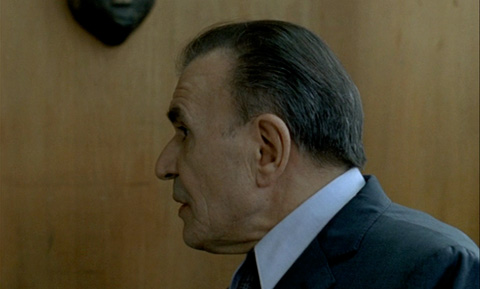
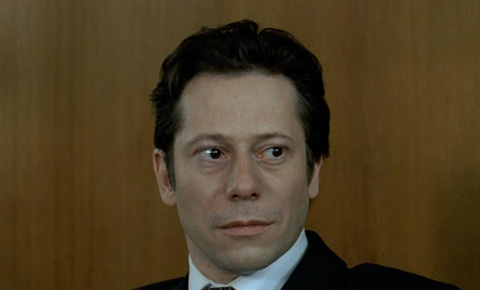
Have a seat (part 2)
The scene with Rose is reenacted several minutes later at the home of Matthias Just. After raising a toast with his guest — “a l’histoire” — Just also invites Simon, by way of a hand gesture, to take an awkwardly close seat beside him.
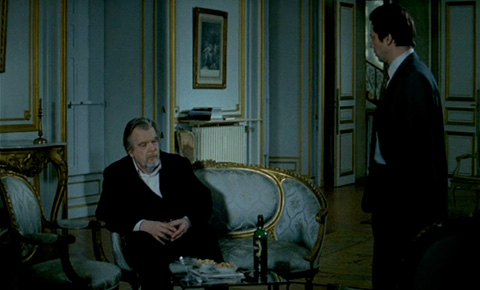
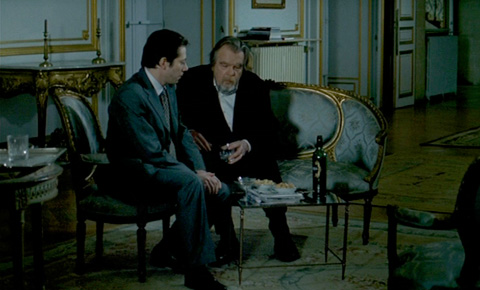
And again Klotz cuts to an unexpected p.o.v., this time between and behind the men. We see only Just from this perspective. Simon excuses himself and exits the room, leaving us behind, still far removed from his subjectivity.
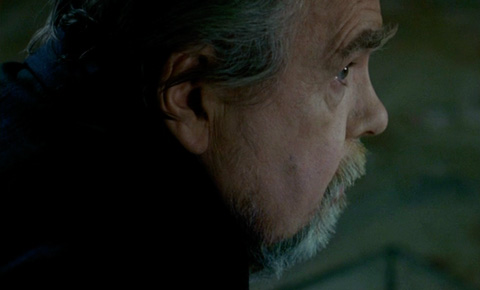
“The sight of her neck game me incredible pleasure.”
Following his late-night conversation with Just, Simon is invited back for a second conversation, this time with Just’s wife, Lucy (Edith Scob). Here, Klotz begins with a more traditional shot / countershot. (Although the mise-en-scene is odd here, too. The chairs are unnaturally positioned in the middle of the room, and the short lens further isolates the characters from their surroundings.)
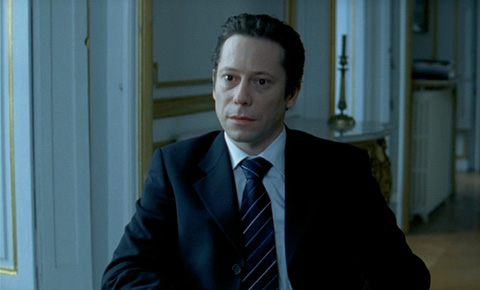
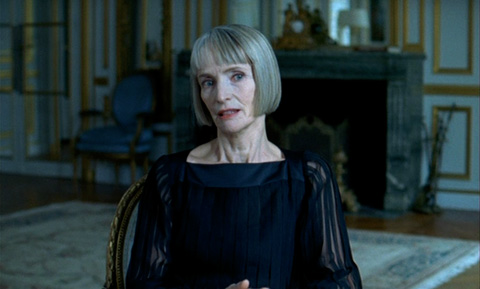
The bigger surprise, though, is the next cut, which jumps fully into Simon’s subjective point of view. Not coincidentally, this scene follows immediately the longest musical sequence and marks the beginning of the film’s second act. I’ll probably return to this moment in a future post.
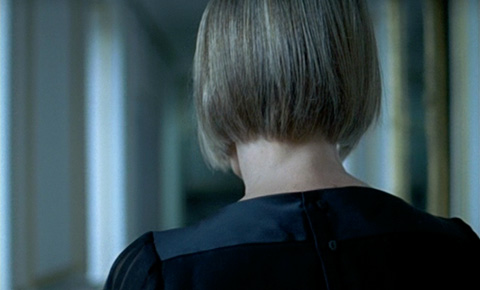
Have a seat (part 3)
There are several other interviews I haven’t mentioned yet, including the critical conversation with Arie Neumann (Lou Castel) that ends the film and that I’ll have to deal with later. But, finally, I’m curious about this scene that takes place in the apartment of Just’s secretary and former lover, Lynn Sanderson (Valerie Dreville). As in the earlier conversations with Rose and Just, Simon begins at a remove from the other person, but in this case it’s Lynn who invites herself to take a more intimate seat beside him.
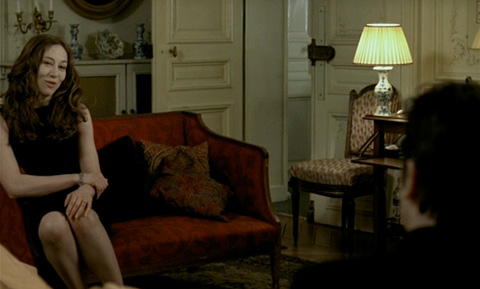
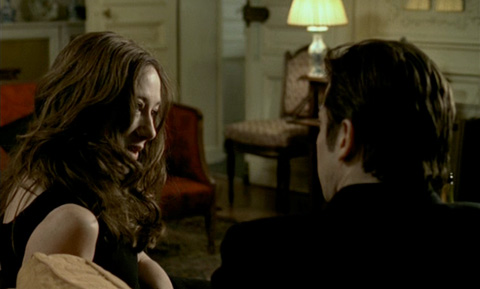
After she divulges more secrets about Just, she stands, leaves the room, and returns, at which point Klotz cuts to one of the only insert shots in the film: Just’s gun, neatly wrapped.
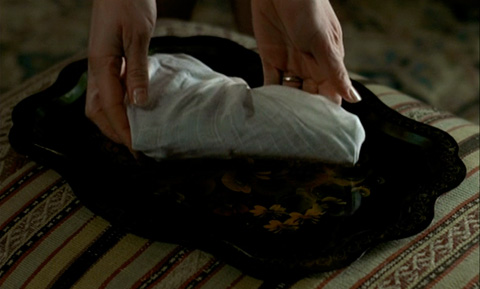
Along with providing some narrative information, the insert allows Klotz to move his camera to the other side of the couch, which gives us visually balanced close-ups.
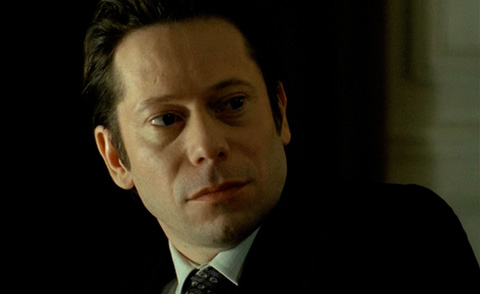
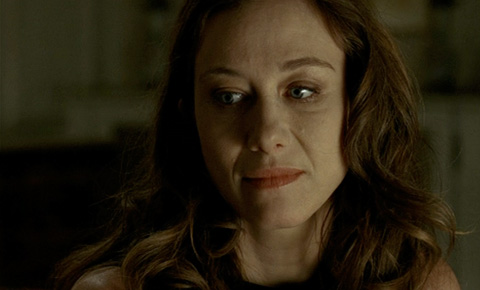
And?
At this point, I haven’t gotten much further than did the reviewers I criticized in my opening paragraph. My conclusion, so far, is pretty obvious: that, in typical noir fashion, Simon begins the film as a detached, clinical observer before gradually being consumed by his investigation. Klotz mirrors that transformation with his camera, moving from an objective p.o.v. to a perspective more closely aligned with Simon’s subjectivity.
What we’re also seeing, though, is Klotz’s considered attention to actors’ bodies and to physical space. The cinema is not a story. It can’t be adequately described in narrative terms.
* If anyone out there can help me see Klotz’s earlier work, let me know.
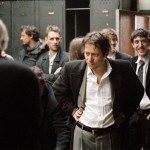
Comments
2 responses to “Heartbeat Detector (2008)”
Wow, fascinating use of blocking/shooting/editing choices for shot/reverse-shot based conversations. I can’t believe that that alone (ok and maybe the presence of Lonsdale and Amalric) has convinced me to see this! Nice work.
Awesome. Thank you for pointing that out.